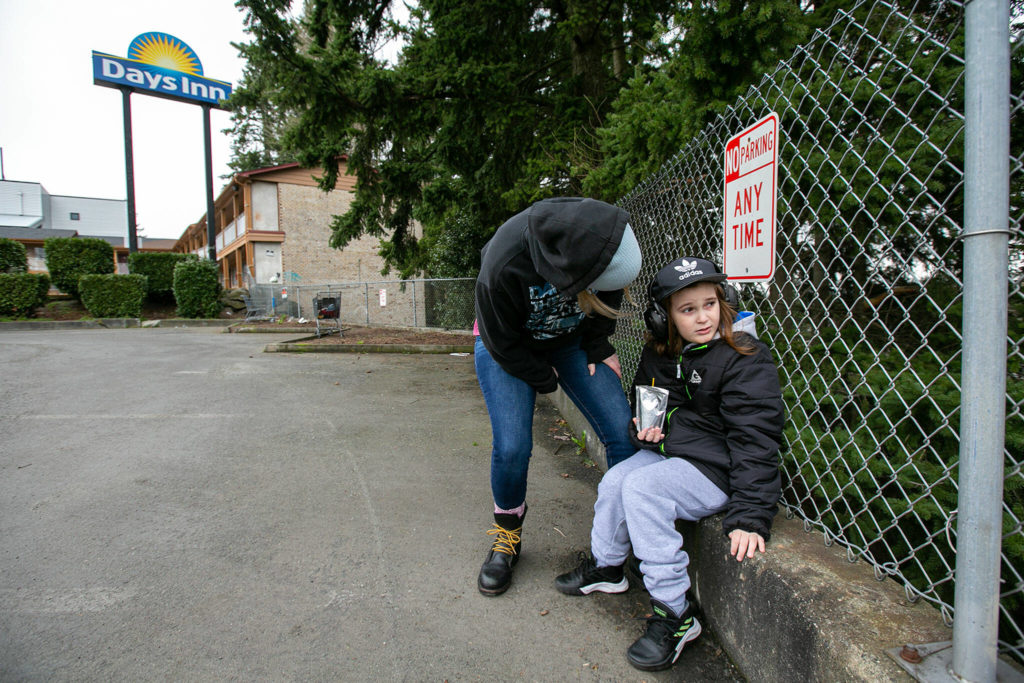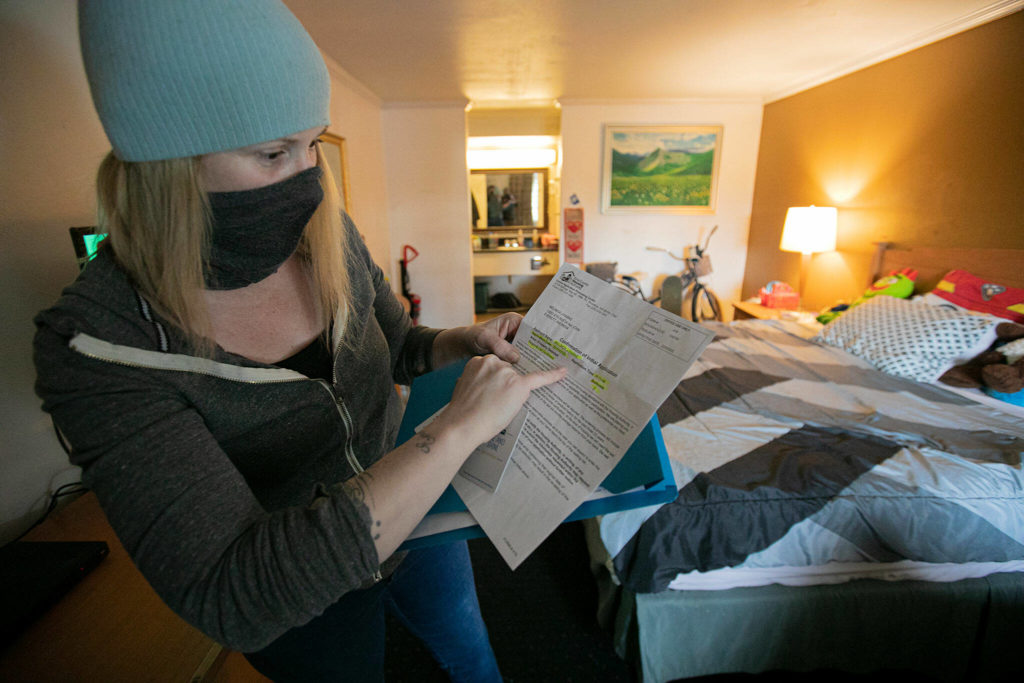EVERETT — Melinda Parke is tired of heating chicken nuggets in a microwave. Living in a motel isn’t ideal, but at least the last one had a little kitchen.
Parke and her son Elijah, 8, are on multiple waiting lists for some type of permanent housing. Elijah, who has severe autism, isn’t handling the disruptions well. It’s noisy at the south Everett motel and strangers knock on their door late at night.
“This has been such a gut-wrenching thing to go through,” Parke said. “I’m watching my son get worse and worse every day.”
The journey to find housing through the Coordinated Entry program is long and, for many families, traumatic. Those in line for permanent housing are scrambling for short-term options while they wait. Children in these families are suffering, too.
Snohomish County and the state’s social service programs are spread across dozens of agencies, nonprofits and religious organizations. People seeking help struggle to find the right programs, even if they call 2-1-1.
Money to address homelessness feels inaccessible to many who need it, despite major investments from the Legislature last year.
“Finding all of this information is like pulling teeth from people,” Parke said.
Dameon Smith and Latina Banks live in the same motel as Parke. They have a toddler daughter and a baby boy. Banks is also pregnant. They lived in motels and a rental car over the past two months.
“We’re looking out for each other, because this is not somewhere our kids, or us, need to be,” Smith said of Parke and Elijah.
The couple’s 2-year-old daughter, Ariel, has been to the hospital twice since December. The first trip came after she caught COVID. The second came after Ariel found a pill on the motel room floor and put it in her mouth. Smith and Banks still aren’t sure what it was.
“I took the pill with me in a plastic bag, but the doctors couldn’t even identify the pill,” Smith said. “… They monitored her and said if it really took effect, if she had it long enough or a lot of dosage in her system, she probably would have been too high to stay awake.”
Smith showed a picture of the pill to a local pharmacy, but they couldn’t identify it either. They said it was possibly self-made fentanyl, Smith said.
“Nobody cares about the fact that my kids are in danger,” Smith said. “I’m just tired. I’m tired of going through the ups and downs, when people say that they’re going to help us and then it’s false hope.”
Kris Jasper, 65, is helping her brother get permanent housing. Jasper is contacting housing and social service programs in multiple counties, because her brother moves often. She said it’s been difficult to find basic information about the process.
“It’s like no one knew, unless you got someone who’s been a social worker for 12, 15 years,” Jasper said. “… I’m pretty system savvy and I couldn’t believe how hard it was.”
Jasper’s brother, 62, lives with schizophrenia. He moved to Western State Hospital when he was 12 or 13 years old. Their family is from Monroe, but Jasper has since moved to Utah. She thought the state was her brother’s guardian and that he was likely living in some type of group home setting. A social worker from another county called her family in October.
“I cannot sleep knowing that he’s homeless,” Jasper said. “… I’ve applied for vouchers, but almost every single place, you’re just getting on a waiting list because they have so many people.”
In Snohomish County, about 900 households are in the county’s Coordinated Entry system. It’s how the county helps people who are homeless, about to be homeless or fleeing violence. The households in Coordinated Entry are living in cars, staying with friends, searching for shelter space or trying to get an emergency motel voucher.
Only 10% of the households in Coordinated Entry are referred to programs that can permanently house them. The social workers who interact with clients, called “resource navigators,” work for a network of nonprofits and religious organizations, as well as the Snohomish County Human Services Department. They are supposed to make the referral within 60 days.
Parke and Elijah are on the wait list for at least two programs that can permanently house them. It’s a three- to six-month wait for one and about a year for the other.
Parke is frustrated and panicking, because she started calling 2-1-1 about a year ago. She wanted to prevent the situation she’s in now. The person Parke spoke with told her that she wouldn’t qualify for help — until she and her son were already homeless.
“Everybody knew about Elijah’s diagnosis,” Parke said. “That is why we started the whole motel thing. That’s what we were told to do.”
Parke said she was also told she and Elijah would be housed with motel vouchers immediately after they became homeless. That hasn’t been the case.
She contacted Compass Health about an emergency motel voucher, which paid for 14 days. Parke said it’s the only immediate housing assistance she has received since becoming homeless in January.
For months, the eviction moratorium prevented Parke and Elijah from losing their apartment. The lease was in a family member’s name, though, so Parke didn’t qualify for rental assistance. She and Elijah ultimately had to leave.
Parke didn’t think it would be difficult to get a motel voucher, since Elijah has a severe, documented disability. Based on her previous call, Parke thought contacting 2-1-1 meant she and Elijah would be housed in a motel right away.
Instead, Parke is exhausting her own resources to pay for the room. She receives a little over $550 per month for Elijah’s Social Security benefits.
Parke’s resource navigator recently texted her that there are “zero resources for more motel vouchers” and recommended Parke consider staying at a family shelter. Parke isn’t sure if she will, though. Elijah is already struggling at the motel, and she worries the shelter would be even more traumatic.
“I’ve done everything I’m supposed to do,” Parke said.
Katie Hayes: katie.hayes@heraldnet.com; Twitter: @misskatiehayes.
Katie Hayes is a Report for America corps member and writes about issues that affect the working class for The Daily Herald.
Talk to us
> Give us your news tips.
> Send us a letter to the editor.
> More Herald contact information.






























